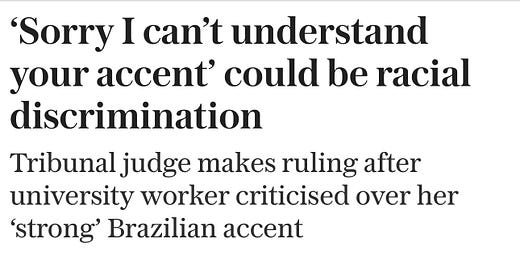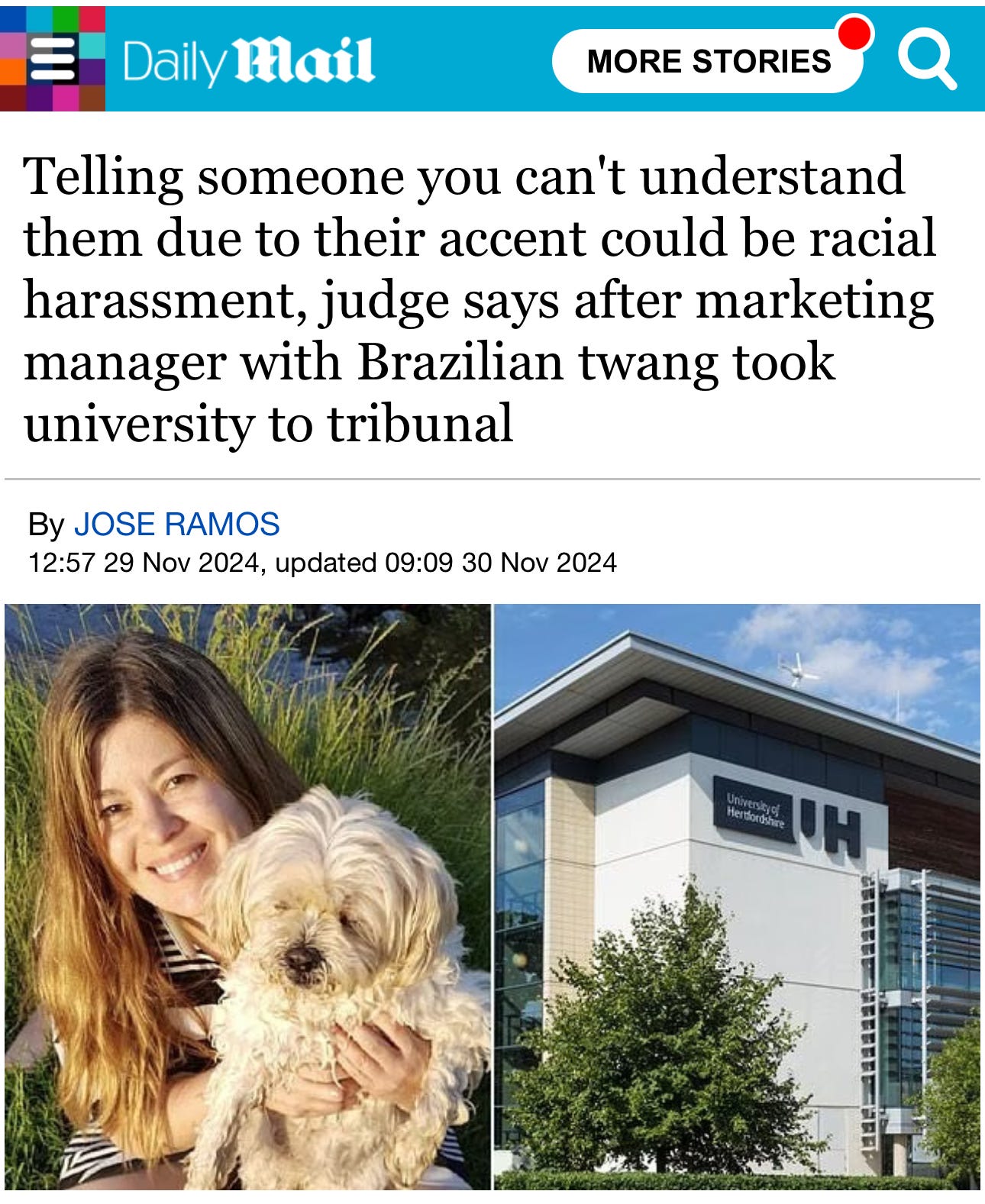Is it racist to tell someone you can't understand their foreign accent?
Apparently it could be, but does that hide a bigger issue?
Hello everyone and a special welcome to new subscribers. Many of you are here because of my work on fascism. Lots more on that topic coming up, including in a bumper end-of-year review post I’ll publish between Christmas and New Year. The common thread of ‘News with a Foreign Accent’ is looking at stories from a different point of view, trying to go beyond the dominant Anglophone perspective, whether you are second-language English or not. A heartfelt *thank you* in particular to all paid and founding subscribers, remember you can always email me directly at barbaraserra@substack.com with questions, observations and suggestions for new posts. Please use the email account you registered your paid subscription with.
Looking back on the year drawing to a close, it’s fair to say 2024 has been quite the year for news headlines. The horrors of war, controversial election campaigns and an over-use (though often justified) of the word ‘unprecedented’. If I had to pick my word for the year, it might be overwhelming.
But even in these times of unrelentingly awful and puzzling headlines, this one below from The Telegraph stopped me in my tracks. If you’re a long-time subscriber to this newsletter, you’ll know why.
‘Sorry I can’t understand your accent’ could be racial discrimination.
**************************
*************************
When you write a newsletter called ‘News with a Foreign Accent’ this headline could definitely be described as triggering. I’ve written at length about how foreign accents in English are linked to culture and are often a hidden barrier to true diversity, including true diversity of thought when English is used as the global language internationally as opposed to just the official language of a particular country, like the UK.
At the same time, I believe that clarity is key. All sorts of assumptions are made when people hear an accent which they feel diverges from the acceptable norm, and that applies to regional accents too. That is something that should always be challanged. But speech is about communication and for communication to be effective it has to be CLEAR. Speaking English with a foreign accent can often make it less clear, whether it’s because of mispronunciations, different intonation/rhythm/speed or trouble with certain phonetics (the ‘th’ sound is the bane of many a second-language English speaker’s life). I don’t believe in trying to change your accent to the point of sounding like something you’re not. You should try to sound like yourself, while being as clear as possible. I know for a fact that ignoring this basic fact can seriously damage any career linked to communication.
That’s why I found this headline interesting and, if I’m truthful, potentially damaging. Although discrimination (intentional or not) can often play an ugly part in this issue, people need to be able to be honest about whether the are having difficulties understanding someone. Already many shy away from doing so, precisely because of the risk of seeming offensive towards someone’s identity and culture. It also ties into the wider debate on immigation.
I don’t think it’s a coincidence that this story was picked up by The Telegraph and The Daily Mail, two right-leaning papers with often hostile attitudes towards immigration. There’s definitely an element of shit-stirring to that headline.
But every voice, and the story behind it, is different, so I reached out to the woman at the centre of this one:
Elaine Carozzi.
Elaine responded straight away. She was very friendly and open to talking about her story. Brazilian with Italian heritage, “we’re chatty people” she says with a smile in her voice. We talked for ages, so she’s not wrong. You can see a cut-down video of our chat below.
Elaine started learning English decades ago, while still in Brazil, and has been living in the UK for more than ten years. In 2017 she was offered a job at the University of Hertfordshire (“I was hired on the same day as the interview”). Her role was to promote arts events within the University itself, reaching out to students and staff members as well as the wider community. She was in charge social media and digital marketing, and vastly increased web traffic, though she admits it was from a low base. When she was hired, she was told that her international background was as asset. No issues were raised about her accent.
That was December 2017. In March 2018 she was told by a supervisor that her post would not be immediately confirmed after the probation period and that the reason for that was her accent. Not her English language skills, which she was told were good, but her ‘strong Brazilian’ accent.
Elaine was shocked and eventually took the University of Hertfordshire to an employment tribunal, accusing it of discrimination and racial harassment. The University also claimed that it was the content of Elaine’s contributions that was problematic and often ‘confusing’ for the rest of the team, despite initial positive feedback and strong performance metrics. In 2021 a tribunal in Watford dismissed Elaine’s claims but her legal battle didn’t end there. An appeal tribunal decided that there were mistakes in the original ruling and her case will now be reheard sometime in 2025.
The Senior Circuit Judge of the Employment Appeal Tribunal, Judge Tayler, found that the original tribunal ‘erred in law’ when it decided to dismiss Elaine’s accusation of racial harassment.
Judge Tayler suggested that saying someone’s foreign accent is difficult to understand could still be harassment because a foreign accent could be related to the protected characteristic of race under the Equality Act 2010, as the way someone speaks may be “an important part of a person’s national or ethnic identity”. Nationality is included under the definition of race under the Equality Act. An action wouldn’t require discriminatory intent to be considered racial harassament.
The original tribunal had ruled that Elaine’s “accent had nothing whatsoever to do with her race”.
It now seems it’s not as clear cut as that.
There are other aspects to Elaine’s case that will be heard at the new tribunal and I’ll definitely revisit this story and get Elaine’s reaction to the final result.
While talking to her it was obvious to see that Elaine is a strong and determined person, but it was also clear that the whole experience had taken a toll on her. After all, the way we speak is closely linked to how we see ourselves, and it’s painful to have our other actions and achievements overshadowed and even cancelled out by something that is so instrinsically a part of our identity.
I have no doubt that Elaine will fight her corner til the end. Eventhough I am sorry for the obvious discomfort the whole situation has brought her, I do think there is a silver lining here. The silver lining is that finally the issue of accents, and the impact that it has on our identities, diversity and employment law, is finally being discussed more openly. I think each case is specific and unique, depending on the linguistic level of the person in question, the role they’re expected to fill and the audience they are supposed to address. But for too long the issue has simply been ignored, causing both confusion in employment law and a sense of unease and rejection in the individuals affected. Hopefully cases like Elaine’s will raise awareness and an honest conversation can be had which will be beneficial to all, regardless of how they speak.






I know someone who does video production, and occasionally video interviews of health sector civil servants, or company directors, as part of corporate presentations, etc.
The other month he had to do one for a director from Northern Ireland. The accent was so thick that both me and my friend were laughing at the video: both of us (both English) were struggling to understand.
It was meant for presentation to Kuwaitis, or something like that. My friend's solution was ingenious, and completely necessary: in the end he arranged to have these "bubbles" with written "key expressions" floating up from the interviewee's mouth as he spoke, in the video, e.g. "we are customer-focused", all that corporate nonsense-speak.
It **looked** like this was being done because these excerpts were particularly "significant". But the reality is that without these bubbles, for 99% of Kuwaitis the whole video would have been completely unintelligible from start to finish.
What's mildy staggering in this case here is the ineptitude of the Hertfordshire "University" HR person who tried to cancel Elaine's hiring, and explicitly said this was the reason. If you don't like the accent, smell, political opinions, irritating laugh, etc. of someone during a probationary period, the simple rule is: find a pretext which will NOT land you in an industrial tribunal. Or, if you can get away with it, say nothing at all.
Accent discrimination exists but it’s not often talked about (except in this newsletter, of course! Go Barbara!) it’s good to see a tribunal drawing a line in terms of what’s an acceptable dismissal. Also, if her accent was really that hard to understand, they could have suggested some diction lesson over firing her. It sounds like it was a (terrible) excuse to dismiss her.